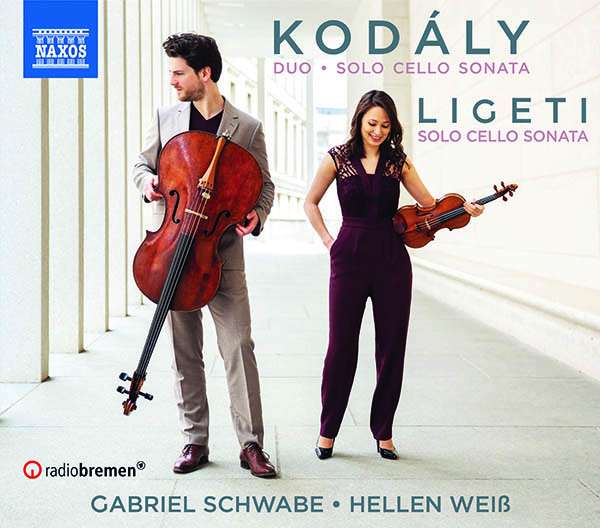Mit der Einspielung von Zoltan Kodalys Duo für Violine und Cello stellen sich Hellen Weiß und Gabriel Schwabe einer starken Konkurrenz: Capuçon-Brüder sowie Fischer/Müller-Schott. Die viel extrovertiertere Capuçon-Interpretation überbieten sie mühelos, mit dem anderen Duo ziehen sie mindestens gleich.
Sie vereinen das Tänzerische und das Dramatische mit sehr vitalem Dialogieren in einer elektrisierenden Darbietung, die weit über den folkloristischen Inhalt des Stücks hinausgeht und die Spannungen der Entstehungszeit in einer sehr emotionalen und packenden Aufführung deutlich werden lässt.
Mit Ligetis Solosonate bleiben wir gewissermaßen beim Dialogieren, bei einer im Kopf des Komponisten stattfindenden Konversation. Die zweiteilige Sonate ist im ersten Satz eine Art Liebesdialog mit einer Cellostudentin, die Ligeti am Konservatorium in Budapest kennengelernt hatte. Der virtuose zweite Satz, Capriccio, entstand mehrere Jahre später. Gabriel Schwabe spielt das Werk sehr leidenschaftlich und dramatisch, ohne freilich je ruppig zu werden. Eine feine Bogenführung und eine perfekte Kontrolle des Klangs erlauben ihm eine exquisite und doch ungemein packende Darbietung.
Schwabes großartige Interpretation von Kodalys Solosonate op. 8, einem weiteren Meisterwerk des Cello-Repertoires, ist deklamatorisch expressiv und auch rein klanglich exzellent. Eine perfekte Intonation und viel Raffinement sowie wunderbare dynamische und farbliche Nuancen machen den Reichtum von Schwabes Spiel aus.
Wie Kodalys Duo ist auch die Sonate, ein Kriegswerk aus dem Jahr 1915, eine eher düstere Musik, oft sehr grüblerisch und reflektiv. Das zentrale Adagio wird mit berückendem Legato und einer atemberaubenden Kolorierung äußerst spannend und intensiv gespielt.
Mit dieser CD hat Schwabe definitiv einen weiteren Beweis für seine Meisterschaft erbracht. Sehr empfehlenswert!
With the recording of Zoltan Kodaly’s Duo for violin and cello, Hellen Weiß and Gabriel Schwabe face strong competition from the Capuçon brothers and the Duo Fischer/Müller-Schott. They effortlessly surpass the much more extroverted Capuçon interpretation, and are at least on a par with the other duo.
They unite the dancing and the dramatic aspects with very vital dialogue in an electrifying performance that goes far beyond the folkloric content of the piece, revealing the tensions of the period of origin in a very emotional and gripping performance.
With Ligeti’s Solo Sonata we remain, so to speak, in dialogue, in a conversation taking place in the composer’s mind. In the first movement, the two-part sonata is a kind of love dialogue with a cello student whom Ligeti had met at the Budapest Conservatory. The virtuoso second movement, Capriccio, was written several years later. Gabriel Schwabe plays the work very passionately and dramatically, without ever becoming harsh. A fine bowing and perfect control of the sound allow him to deliver an exquisite and yet incredibly gripping performance.
Schwabe’s magnificent interpretation of Kodaly’s Solo Sonata op. 8, another of the masterpieces of the cello repertoire, is declamatorily expressive and no less excellent for its polished sound. A perfect intonation and a lot of refinement as well as wonderful dynamic and colour nuances make up the richness of Schwabe’s playing.
Like Kodaly’s duo, the Sonata, a war work from 1915, is a rather gloomy music, often very brooding and reflective. The central Adagio is played with enchanting legato and a breath-taking colouration, extremely exciting and intense.
With this CD, Schwabe has definitely given further proof of his mastery. Highly recommended!
INTERVIEW:
https://www.pizzicato.lu/hellen-weis-gabriel-schwabe-unsere-klangvorstellungen-sind-gemeinsam-gewachsen/



















